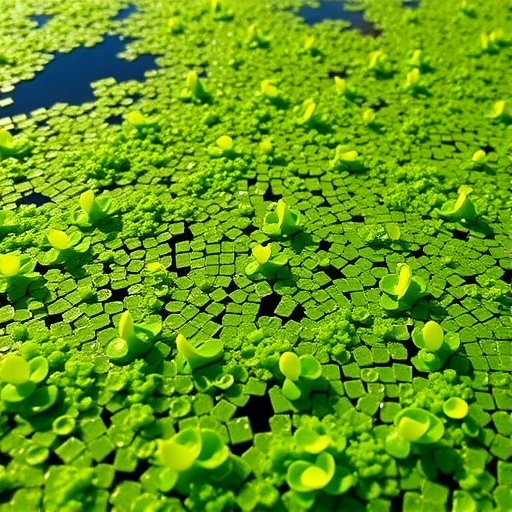In recent years, the pressing need for innovative solutions to combat environmental pollution has garnered intense global attention. The alarming levels of pollution affecting various ecosystems worldwide highlight an urgent call for sustainable and effective remediation strategies. Recent research illuminates the potential of algae-based bioremediation as an effective, eco-friendly solution to tackle contaminants in soil, water, and air. This revolutionary approach not only underscores the environmental significance of algae but also emphasizes their ability to restore ecological balance in polluted settings.
Algae, often overshadowed by more conventional forms of vegetation, present a unique opportunity for bioremediation processes thanks to their rapid growth rates and remarkable adaptability. In the wake of industrialization and urbanization, many water bodies, soil systems, and even air quality have suffered from detrimental contamination levels. The utilization of algae offers a green technology that harnesses the natural abilities of these organisms to absorb, metabolize, and convert harmful pollutants into less harmful substances. This seemingly straightforward biological process promises to revolutionize how pollutants are dealt with in various ecosystems.
Through the process of photosynthesis, algae utilize light energy to convert carbon dioxide into organic compounds. This characteristic not only aids in carbon sequestration but also allows algae to thrive on a variety of pollutants, such as heavy metals and organic toxins. As algae proliferate in contaminated mediums, they effectively sequester these pollutants, reducing their toxic concentration and restoring the health of the environment. Such attributes position algae at the forefront of bioremediation technologies, offering an environmentally safe alternative compared to traditional chemical methods that may result in further ecological harm.
Research highlights several critical benefits associated with algae-based bioremediation, revealing its multifaceted applications across various environmental dimensions. For instance, in aquatic systems, algae can significantly mitigate nutrient loading, notably from agricultural runoff that frequently leads to eutrophication. Through careful cultivation strategies, such as algal blooms in constructed wetlands, algae can naturally absorb excess nutrients like nitrogen and phosphorus, ultimately cleansing waterways and restoring aquatic life.
On land, algae hold the potential to rehabilitate contaminated soils laden with heavy metals and organic pollutants. The capability of certain algae species to bioaccumulate toxic substances offers a promising solution for the restoration of industrial wastelands and mining areas. The land suited for agriculture yet plagued by legacy pollutants can witness a rebirth through the implementation of algae-based restoration methods. As soil quality improves, it not only fosters a healthier ecosystem but also boosts agricultural productivity in previously compromised areas.
Moreover, the applicability of algae extends to air remediation, where they can absorb harmful gases, thus improving air quality. Utilizing photobioreactors in urban settings could revolutionize how cities manage air pollution. By integrating algae into urban planning, municipalities can develop natural systems that detoxify air while creating aesthetic green spaces. This innovative fusion of infrastructure and nature aligns with global strategies aimed at reducing urban carbon footprints and enhancing living conditions.
Despite these promising attributes, the practical implementation of algae-based bioremediation faces challenges that need to be addressed. Factors such as scaling up production, maintaining environmental stability, and the selection of appropriate algae strains for specific contaminants are vital to ensure the efficacy and efficiency of algae remediation methods. Future research efforts must focus on optimizing these parameters to enhance the overall effectiveness of this bioremediation approach.
Furthermore, cultivating public awareness about the potential of algae in combating pollution is crucial. Education initiatives that outline the significance of algae and their role in ecological restoration can galvanize community participation and support. By demonstrating the efficacy of natural solutions, society can begin to shift its perception away from reliance on synthetic chemicals, fostering a more sustainable approach to environmental management.
As the climate crisis accelerates, rethinking our relationships with the natural world becomes essential. Algae-based bioremediation represents more than just a technological solution; it symbolizes a paradigm shift in how we perceive and interact with our environment. Embracing these biological technologies could pave the way for more resilient ecosystems, capable of adapting to and recovering from anthropogenic pressures.
Incorporating algae into standard environmental remediation protocols could significantly enhance restoration efforts in heavily impacted areas. Governments and organizations across the globe must consider investing in research and development that prioritizes algal applications. Multidisciplinary collaborations between scientists, policymakers, and local communities are essential to overcome the barriers that hinder the adoption of algae in large-scale projects.
In conclusion, the burgeoning field of algae-based bioremediation represents a promising frontier in mitigating pollution across various ecosystems. This approach not only offers innovative, sustainable alternatives to traditional remediation techniques but also showcases the remarkable capabilities inherent in natural systems. As we stand at the crossroads of environmental crisis and reinvention, embracing algae serves as a clarion call towards restoring our planet’s health. By leveraging these versatile organisms, we can propel ourselves into a greener future, where environmental degradation becomes a challenge of the past.
Subject of Research: Algae-based bioremediation of soil, water, and air
Article Title: Algae-based bioremediation of soil, water, and air: a solution to polluted environment
Article References:
Munir, N., Sarwar, Z., Abideen, Z. et al. Algae-based bioremediation of soil, water, and air: a solution to polluted environment. Environ Sci Pollut Res (2025). https://doi.org/10.1007/s11356-025-36880-9
Image Credits: AI Generated
DOI: 10.1007/s11356-025-36880-9
Keywords: Algae, bioremediation, pollution, soil restoration, aquatic ecosystems, air quality, environmental science.




